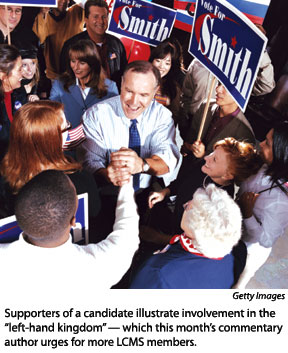By Uwe Siemon-Netto
Theologically, there is really nothing objectionable about the idiosyncratic preference of many Lutherans for the back pews in church.
I am sure that God does not care one iota where you sit during the Sunday service, as long as this does not reflect unchristian prejudices or a lack of interest in worship. Perhaps the spiritual right-hand kingdom provides us with a foretaste of life beyond time and space. So stay in the rear if that’s where you want to be.
That said, does this principle also apply to the left-hand realm where we live out our biological lives using natural reason to guide us? Do we, who are 
More to the point, what are we to think of the fact that in the 110th Congress our number [of Lutherans] has shrunk from 20 to 18? And what does it tell us about America’s 2.5 million Missouri Synod Lutherans that only two, Dave Reichert (R-WA) and John M. Shimkus (R-IL), were elected to the House of Representatives last fall, and none to the Senate?
Two congressmen — that puts us on a par with the Unitarians, of whom there are only 217,000 inhabiting this country. Is there some pogrom underway keeping the 10th-largest denomination in the United States from being duly represented in Washington, a conspiracy perhaps marginalizing confessional Lutherans to the point that even in Missouri no Missouri Synod Lutheran made it to D.C. this time?
But no, the Wisconsin Evangelical Lutheran Synod, with a mere 400,000 members, has two of them in the federal legislature. Given that statistic, it wouldn’t make much sense to whine about an alleged anti-Lutheran bias in politics. Instead, I suspect that a significant number of Lutherans might hold a bias against politics — and for that matter, against work in the media as well.
Type “famous Lutheran journalists” into your Google search engine, and what do you get? Nix! The only well-known Lutheran media personality I can think of is the amusingly grumpy Jack Cafferty, who reads viewers’ e-mails on CNN.
A recent New York Times headline announced: “Christian Right Labors to Find ’08 Candidate.” This should have activated Lutheran reflexes among LCMS, ELCA, and WELS members alike. Certain types of conservative evangelicals and liberal Protestants actually consider it their godly mission to find a presidential candidate of their persuasion. Lutherans, on the other hand, are blessed with a sounder theology for how this world ought to be run.
“It is sufficient for the emperor to possess reason,” Martin Luther wrote. Repla
At a time when America is at war, the sober Lutheran voice stressing reason as the God-given operating system for the left-hand kingdom is paramount.
Should America remain in Iraq or withdraw its forces, regardless of the consequences? Should even larger troop contingents be sent there, or should the U.S. presence be diminished and limited to certain pockets? Should petroleum consumption in this country be reduced by radical measures, or should we trust market forces?
These vital questions and so many others require unruffled rational assessment rather than the ideologically motivated hyperbole plaguing us today. This is where a much stronger presence of men and women raised in the Lutheran ethos would be a blessing on both sides of the aisle in Congress — and in the media. This is also why during a forum at Concordia Seminary in St. Louis, evangelicals and Catholics appealed to Lutherans last fall to open their doctrinal treasure chest to this confused postmodern America — for the benefit of all.
Why is it, then, that the ELCA, LCMS, and WELS together are so woefully underrepresented in the nation’s capital that the result seems like an absurd joke? There are in the United States 2.2 million Episcopalians, compared with nine million Lutherans. But 37 congressmen and senators belong to The Episcopal Church (TEC), twice as many as to the three largest Lutheran denominations put together. Why this discrepancy?
The answer lies perhaps in a phenomenon Henry V. Gerike, a pastor, organist, and choirmaster in St. Louis, once called “Lutheran minimalism.” Gerike was referring to a curious trend among Lutheran congregations: “When the time comes for them to build a new sanctuary, and they have a choice between installing a new organ befitting that building or clinging to their old and by now incompatible instrument, they would opt for the latter.”
The analogy is obvious. Lutherans have inherited the largest treasure of sacred music of all Protestant denominations, but they are, in Gerike’s words, too minimalist to splash for appropriate organs on which these works can be properly played. Similarly, the Reformers have handed down to today’s Lutherans theological gems that would reintroduce sanity to public life. But no, today’s Lutherans prefer to linger in the back pews of the left-hand kingdom eschewing these wonderful gifts.
Does nobody in American Lutheranism hear the sirens’ wail going out to parishes, Lutheran schools, and universities? It alerts pastors, teachers, and parents that the Lutheran kairos is here — meaning that the opportune time has come for them to instruct students to roll up their sleeves, move forward from their back pews, and fully engage this dangerous world to which they have so much to contribute. Not to do so would in the end reduce Lutherans to a species neither Scriptures nor the Confessions want us to be, and few Americans like: separatist fundamentalists selfishly dismissing this unredeemed world, which is still God’s kingdom after all, if you don’t mind.
In rhetoric, the word kairos describes a passing instant that must be grabbed swiftly and with determination if success is to be achieved. This means that Lutherans can very well miss their moment in history if they insist on remaining by the exit of their worldly existence where all of us have a divine vocation.
Dr. Uwe Siemon-Netto is director of the Concordia Seminary Institute on Lay Vocation in St. Louis.
Posted March 29, 2007
